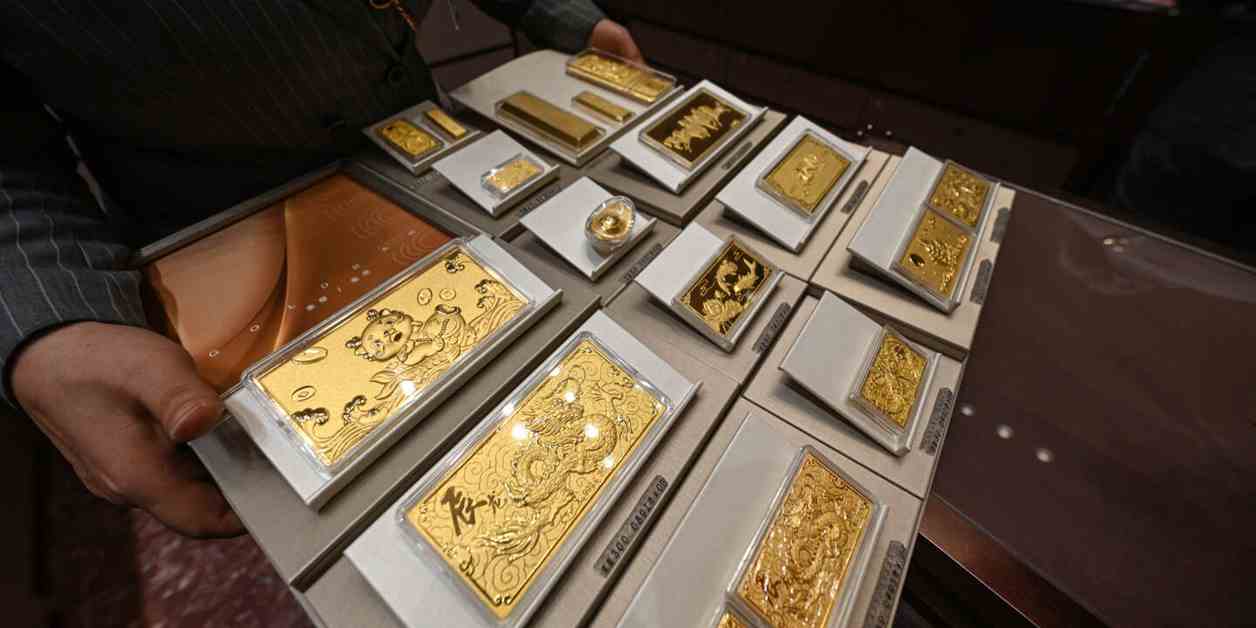Facing economic uncertainties, Chinese people rush to gold, « safer to invest money »
In the midst of economic challenges in the world’s second-largest economy after years of pandemic and a struggling real estate market, gold consumption has increased by 6% in the country in the first quarter. The Caibai store is a renowned jewelry shop in the Chinese capital. « Since 1956, » reads a sign beneath the storefront of the shop located in western Beijing. On the ground floor, potential buyers have their eyes on gold jewelry and items. One floor is dedicated to gemstones, while another is specifically for jade. But at the moment, the most serious activity is taking place on the top level. At the top of the escalators, customers encounter a large screen displaying a graph that has been steadily rising for the past few months: the price of gold per gram on the Shanghai market. It was trading around 550 yuan, nearly 70 euros, on May 27.
Customers speak in hushed tones. Many do not possess great wealth but rather their small savings. They carefully observe before asking a question. Caibai offers a variety of weights, from small pieces ranging from 1 to 30 grams featuring pandas, with certification from the central bank, to bars of 50, 100, or 300 grams. The most popular ones are those engraved with animals from the Chinese zodiac, especially the dragon for this year. Under a display case, the customer can reach out to touch a large ingot to see if they can lift it.
A man inquires the seller in a blue shirt and pink tie if he can take a closer look at a small gold plate. He reveals that he buys a little bit each year. « In the current context, it is the safest way to invest money, » says Mr. Lu, who does not provide his last name. The seller, Wang Anmei, has seen an increasing number of customers like him passing through. With the second-largest economy in the world struggling to recover after years of pandemic and a crisis in the real estate market, gold is more than ever the safe haven. « It’s solid. People believe it’s the best investment. There used to be real estate and the stock market, but now people are hesitant about those, while gold has continued to rise, » says Mr. Wang. Gold consumption increased by 6% in the first quarter in China, following a 9% surge in 2023.
For the Chinese, whose currency is only partially convertible, it is challenging to withdraw funds to invest abroad. Local stock markets, on the other hand, have proven to be unstable, experiencing a drop and concerning fluctuations for small investors in 2023, until the massive intervention of state investors to stabilize prices at the end of January 2024, approaching the Lunar New Year.
As economic uncertainties loom, it seems that Chinese people are turning to gold as a safe investment option in the face of market volatility and instability. Whether it’s for the symbolic value or the perceived security it offers, gold continues to be a popular choice for many investors in China. Amid the fluctuating economic landscape, the shine of gold seems to be a reassuring beacon for those seeking stability and security in uncertain times.
Overall, the trend of Chinese people rushing to gold amidst economic uncertainties reflects a broader shift towards safer investment options and assets in the face of volatility in traditional markets. Gold’s enduring appeal and perceived stability make it a go-to choice for many seeking to safeguard their wealth in turbulent times. As the economic landscape continues to evolve, the allure of gold as a safe haven asset remains strong, offering a sense of security and stability in an unpredictable world.

